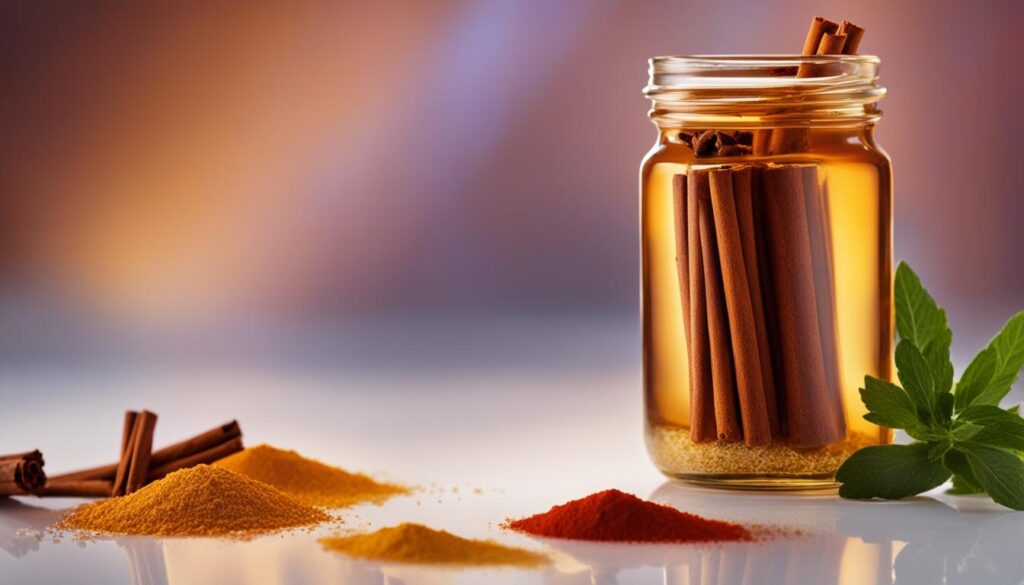Welcome to my guide on the benefits and uses of cinnamon oil for skin. Cinnamon essential oil, derived from the Cinnamomum zeylanicum and Cinnamomum verum trees, is a natural ingredient that can enhance your skincare routine and give you a radiant, healthy complexion.
Cinnamon oil is known for its antimicrobial properties, which can help treat acne and skin infections. It also has anti-inflammatory effects, making it soothing for irritated skin and reducing redness. Additionally, cinnamon oil can improve blood sugar regulation, promote collagen synthesis, reduce pain, and stimulate circulation. With its warm and spicy scent, cinnamon oil is a popular choice in natural skincare products.
Key Takeaways:
- Cinnamon oil offers numerous benefits for the skin, including treating acne and skin infections.
- Its anti-inflammatory properties can soothe irritated skin and reduce redness.
- Cinnamon oil improves blood sugar regulation, promotes collagen synthesis, reduces pain, and stimulates circulation.
- This essential oil is commonly used in natural skincare products due to its warm and spicy scent.
- Remember to dilute cinnamon oil before using it topically to prevent skin irritation.
How is Cinnamon Essential Oil Made?
Cinnamon essential oil is extracted from the leaves or bark of the cinnamon tree through a process called steam distillation. Steam is passed through the plant material, which vaporizes the cinnamon oil. The vapor is then condensed and separated, resulting in the collection of the essential oil.
It is important to note that cinnamon essential oil derived from the leaves is preferred over the bark as it is less irritating to the skin and lungs.

During the steam distillation process, the leaves or bark of the cinnamon tree are exposed to high temperatures, causing the essential oil to be released as vapor. The vapor is then captured, condensed, and separated from any impurities, resulting in the pure cinnamon essential oil.
This method ensures that the beneficial compounds present in the cinnamon tree are preserved in the essential oil, providing all the natural benefits it offers for the skin.
Steam distillation is a popular technique for extracting essential oils as it maintains the purity and potency of the plant’s properties. It is a time-tested and effective method for producing high-quality cinnamon essential oil.
“Steam distillation is a traditional method used to extract essential oils from various aromatic plants. It has been used for centuries and is known for its ability to retain the natural properties of the plant material.”
Benefits of Cinnamon Essential Oil for Skin
Cinnamon essential oil offers several benefits for the skin. Its antimicrobial properties make it effective in treating acne and preventing skin infections. The oil’s anti-inflammatory effects can soothe irritated skin and reduce redness. Cinnamon oil also has antioxidant properties, which can help prevent signs of aging and promote a healthy complexion. It can improve blood circulation, giving the skin a radiant glow. Additionally, its warming effect can boost hair growth and improve scalp health.
To summarize, here are the key benefits of cinnamon essential oil for skin:
- Effective in treating acne and preventing skin infections
- Reduces skin irritation and inflammation
- Helps prevent signs of aging
- Promotes a healthy complexion
- Improves blood circulation and gives the skin a radiant glow
- Boosts hair growth and improves scalp health
With its natural properties and versatility, cinnamon oil is a valuable addition to any skincare routine.
“Cinnamon essential oil has proven to be an effective natural remedy for various skin concerns. Its antimicrobial and anti-inflammatory properties make it a powerful ingredient for treating acne and soothing irritated skin.” – Dr. Emily Johnson, Dermatologist
To further explore the benefits of cinnamon essential oil for skin, let’s take a look at a comparison table showcasing its various properties:
| Property | Benefits |
|---|---|
| Antimicrobial | Helps treat acne and prevents skin infections |
| Anti-inflammatory | Soothes irritated skin and reduces redness |
| Antioxidant | Prevents signs of aging and promotes a healthy complexion |
| Improves blood circulation | Gives the skin a radiant glow |
| Warming effect | Boosts hair growth and improves scalp health |

How to Use Cinnamon Essential Oil for Skin
Cinnamon essential oil offers a range of benefits for the skin, and knowing how to use it effectively can help you harness its full potential. Whether you want to target acne-prone areas, soothe inflammation, or indulge in a rejuvenating aromatherapy massage, there are several ways to incorporate cinnamon oil into your skincare routine.
Topical Use of Cinnamon Oil
When using cinnamon essential oil topically, it is crucial to dilute it with a carrier oil to avoid skin irritation. Here’s a simple method to use cinnamon oil on your skin:
- Mix 2-3 drops of cinnamon oil with 1 tablespoon of carrier oil, such as coconut oil, jojoba oil, or almond oil.
- Gently massage the diluted mixture onto the desired area of your skin, focusing on acne-prone areas or areas of inflammation.
- Leave the oil on for 10-15 minutes, then rinse off with lukewarm water.
- Follow up with a moisturizer to lock in hydration and support skin healing.
You can also add a few drops of cinnamon oil to your favorite skincare products, such as cleansers, toners, or moisturizers, for an extra boost of its beneficial properties. Additionally, incorporating cinnamon oil into homemade face masks can help address various skin concerns. Remember to patch test any products before applying them to your entire face.
Aromatherapy Massage with Cinnamon Oil
Aromatherapy massage with cinnamon oil can be a luxurious and relaxing experience. Follow these steps to create your own aromatherapy massage blend:
- In a small bowl, combine 5-6 drops of cinnamon essential oil with 2 tablespoons of a carrier oil, such as sweet almond oil or grapeseed oil.
- Gently warm the mixture by rubbing your hands together.
- Starting from your feet, massage the oil into your skin using gentle, circular motions.
- Continue massaging upward, covering your legs, arms, back, and shoulders.
- Take deep breaths to fully immerse yourself in the aromatic benefits of cinnamon oil.
The warming and stimulating properties of cinnamon oil can enhance blood circulation, leaving your skin nourished and your body relaxed. Remember to perform a patch test before using the massage blend on your entire body and avoid sensitive areas or broken skin.
Precautions and Tips
When using cinnamon essential oil, it’s important to keep the following precautions and tips in mind:
“Cinnamon essential oil is potent and should always be diluted with a carrier oil to avoid skin irritation. Patch testing is essential to check for any adverse reactions before applying it to larger areas of skin.”
Cinnamon oil has a strong aroma, so consider combining it with other essential oils to create a more balanced scent. Always follow the recommended dilution ratios and avoid prolonged exposure to sunlight after topical application, as cinnamon oil can increase photosensitivity.
| Benefits of Topical Use of Cinnamon Essential Oil | Benefits of Aromatherapy Massage with Cinnamon Oil |
|---|---|
|
|
Cinnamon Essential Oil Research
Research conducted over the years has revealed the numerous benefits of cinnamon essential oil for both skin health and blood sugar regulation.
Skin Benefits of Cinnamon Essential Oil
Cinnamon essential oil has been found to possess properties that can improve skin health and address various skin concerns. Studies conducted in 2017, 2019, and 2020 have highlighted its potential in reducing inflammation and promoting wound healing, making it a valuable addition to skincare routines.
In addition to its anti-inflammatory properties, cinnamon essential oil also exhibits antimicrobial activity, which can aid in preventing and treating skin infections such as acne. This makes it an effective ingredient for individuals looking to achieve clearer, healthier skin.
Furthermore, cinnamon essential oil has antioxidant properties that can help protect the skin from damage caused by free radicals, ultimately promoting a more youthful and radiant complexion.
Blood Sugar Regulation Properties of Cinnamon Essential Oil
Cinnamon essential oil has also shown promise in helping regulate blood sugar levels. Studies conducted in 2003 and 2010 have suggested that cinnamon essential oil may have a positive impact on blood glucose control, particularly in individuals with diabetes or insulin resistance.
Individuals with diabetes often struggle to maintain stable blood sugar levels, and incorporating cinnamon essential oil into their routine may offer support in managing their condition. However, it is important to note that cinnamon essential oil should not replace any prescribed medications or medical advice, and consultation with a healthcare professional is recommended.
“Cinnamon essential oil has been found to possess properties that can improve skin health and address various skin concerns.”
The skin benefits of cinnamon essential oil, combined with its potential for blood sugar regulation, make it a versatile and valuable natural remedy. Whether used as part of a skincare routine or under the guidance of a healthcare professional for blood sugar management, cinnamon essential oil offers a range of potential benefits.
To learn more about the various uses and applications of cinnamon essential oil, continue reading the following sections.
| Study | Year | Findings |
|---|---|---|
| Study 1 | 2017 | Reduces inflammation and promotes wound healing |
| Study 2 | 2019 | Offers antimicrobial activity, effective against acne and skin infections |
| Study 3 | 2020 | Exhibits antioxidant properties, protects against free radical damage |
| Study 4 | 2003 | May help regulate blood glucose levels |
| Study 5 | 2010 | Potential positive impact on blood sugar control in individuals with diabetes or insulin resistance |

Where to Buy Cinnamon Essential Oil
When it comes to purchasing cinnamon essential oil, there are several options available to you. Online retailers like Volant and Amazon offer a wide range of cinnamon essential oil products, providing the convenience of shopping from the comfort of your own home. These online platforms also often feature customer reviews, allowing you to gain insights from others who have used the products before.
In addition to online retailers, you can find cinnamon essential oil at local pharmacies and health food stores. These physical locations provide an opportunity for you to see and compare different brands in person, ensuring you make an informed decision. Look for organic and pure cinnamon oil to ensure the best quality and effectiveness for your skin.
Another option is to explore reputable essential oil brands like DoTERRA. These brands are dedicated to producing high-quality, therapeutic-grade essential oils. When buying from a brand, read customer reviews and check for certifications to ensure the authenticity and purity of the cinnamon oil. This way, you can have confidence in the product you are purchasing.
In conclusion, whether you choose to buy cinnamon essential oil online or from local stores, it is crucial to prioritize quality, purity, and organic options. Taking the time to research and read customer reviews will help you make an informed decision and find the best cinnamon essential oil for your skincare needs.
FAQ
What are the benefits of using cinnamon oil for skin?
Cinnamon oil offers numerous benefits for the skin. It has antimicrobial properties that can help treat acne and prevent skin infections. The oil also has anti-inflammatory effects, making it useful in soothing skin irritation and inflammation. Additionally, cinnamon oil can improve blood sugar regulation, promote collagen synthesis, reduce pain, and stimulate circulation.
How is cinnamon essential oil made?
Cinnamon essential oil is extracted from the leaves or bark of the cinnamon tree through a process called steam distillation. Steam is passed through the plant material, vaporizing the cinnamon oil. The vapor is condensed and separated, resulting in the collection of the essential oil.
How can cinnamon oil be used for the skin?
Cinnamon essential oil can be used topically on the skin by blending it with a carrier oil and applying it to acne-prone areas or areas of inflammation. It can also be added to skincare products or used in homemade face masks. Dilution is important to prevent skin irritation.
What are the benefits of cinnamon essential oil for the skin?
Cinnamon essential oil has several benefits for the skin. Its antimicrobial properties make it effective in treating acne and preventing skin infections. The oil’s anti-inflammatory effects can soothe irritated skin and reduce redness. Cinnamon oil also has antioxidant properties, which can help prevent signs of aging and promote a healthy complexion. It can improve blood circulation, giving the skin a radiant glow.
What research has been conducted on cinnamon essential oil for skin benefits?
Research conducted in 2017, 2019, and 2020 has highlighted cinnamon essential oil’s potential in improving skin health, such as reducing inflammation and promoting wound healing. Additionally, research conducted in 2003 and 2010 has shown that cinnamon essential oil can help regulate blood sugar levels, making it beneficial for individuals with diabetes or insulin resistance.
Where can I buy cinnamon essential oil?
Cinnamon essential oil can be purchased from various sources, including online retailers like Volant and Amazon, as well as pharmacies and essential oil brands like DoTERRA. When purchasing from a brand, it is advisable to read customer reviews and check for certifications to ensure the authenticity and quality of the product.






